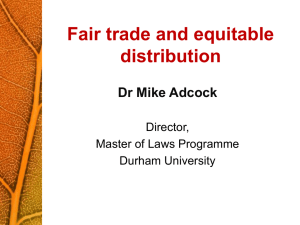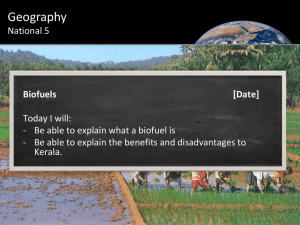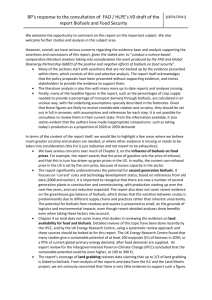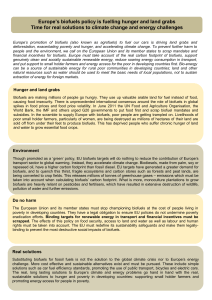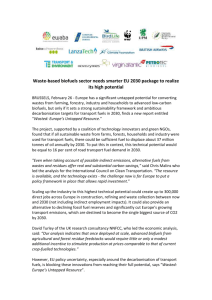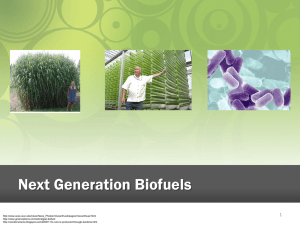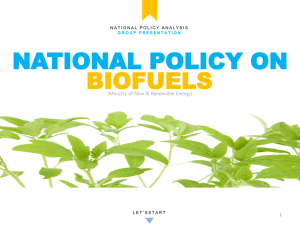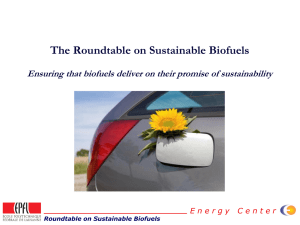Word - Nuffield Bioethics
advertisement
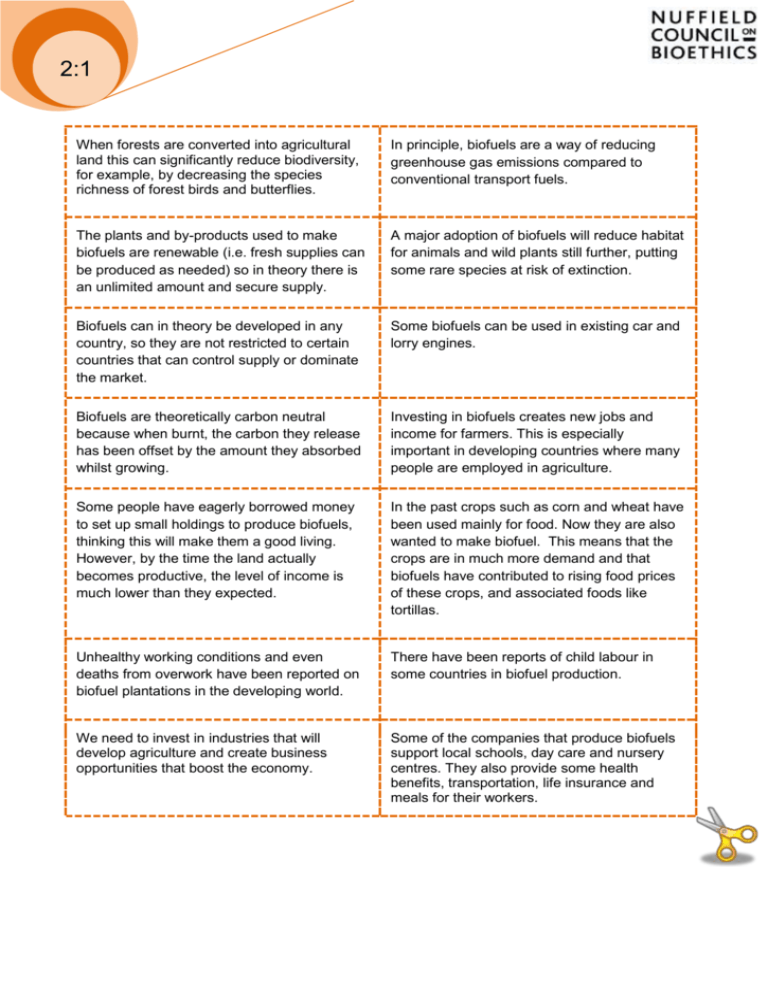
2:1 When forests are converted into agricultural land this can significantly reduce biodiversity, for example, by decreasing the species richness of forest birds and butterflies. In principle, biofuels are a way of reducing greenhouse gas emissions compared to conventional transport fuels. The plants and by-products used to make biofuels are renewable (i.e. fresh supplies can be produced as needed) so in theory there is an unlimited amount and secure supply. A major adoption of biofuels will reduce habitat for animals and wild plants still further, putting some rare species at risk of extinction. Biofuels can in theory be developed in any country, so they are not restricted to certain countries that can control supply or dominate the market. Some biofuels can be used in existing car and lorry engines. Biofuels are theoretically carbon neutral because when burnt, the carbon they release has been offset by the amount they absorbed whilst growing. Investing in biofuels creates new jobs and income for farmers. This is especially important in developing countries where many people are employed in agriculture. Some people have eagerly borrowed money to set up small holdings to produce biofuels, thinking this will make them a good living. However, by the time the land actually becomes productive, the level of income is much lower than they expected. In the past crops such as corn and wheat have been used mainly for food. Now they are also wanted to make biofuel. This means that the crops are in much more demand and that biofuels have contributed to rising food prices of these crops, and associated foods like tortillas. Unhealthy working conditions and even deaths from overwork have been reported on biofuel plantations in the developing world. There have been reports of child labour in some countries in biofuel production. We need to invest in industries that will develop agriculture and create business opportunities that boost the economy. Some of the companies that produce biofuels support local schools, day care and nursery centres. They also provide some health benefits, transportation, life insurance and meals for their workers. 2:1 Large amounts of greenhouse gases are released by clearing land to grow biofuels and some scientists say this is enough to negate any of the intended future benefits. Biofuels production may be contributing to food shortages in poorer countries, as farmland traditionally used for producing food and animal feed has been turned over to grow crops suitable for biofuels. We need to be confident that we will still have fuel even if oil prices go sky high or oil begins to run out. Biofuels are one of the only alternatives we have for petrol and diesel. Fertiliser is used to help the plants that are used to make biofuels grow. When it rains the water mixes with the fertiliser and flows down to rivers and streams. This is called fertiliser run-off and can cause damage to wildlife. Some people say that we should concentrate on reducing energy use and reducing gases that are harmful to the atmosphere and not on making lots of money as quickly as possible at the cost of the environment. Small-scale biofuel plants can provide fuel and livelihoods to local communities, meaning they become less reliant on outside sources to support their lives. 2:1 Sort cards with answers When forests are converted into agricultural land this can significantly reduce biodiversity, for example, by decreasing the species richness of forest birds and butterflies. The plants and by-products used to make biofuels are renewable (i.e. fresh supplies can be produced as needed) so in theory there is an unlimited amount and secure supply. Biofuels can in theory be developed in any country, so they are not restricted to certain countries that can control supply or dominate the market. In principle, biofuels are a way of reducing greenhouse gas emissions compared to conventional transport fuels. A major adoption of biofuels will reduce habitat for animals and wild plants still further, putting some rare species at risk of extinction. Some biofuels can be used in existing car and lorry engines. Biofuels are theoretically carbon neutral because when burnt, the carbon they release has been offset by the amount they absorbed whilst growing. Investing in biofuels creates new jobs and income for farmers. This is especially important in developing countries where many people are employed in agriculture. Some people have eagerly borrowed money to set up small holdings to produce biofuels, thinking this will make them a good living. However, by the time the land actually becomes productive, the level of income is much lower than they expected. In the past crops such as corn and wheat have been used mainly for food. Now they are also wanted to make biofuel. This means that the crops are in much more demand and that biofuels have contributed to rising food prices of these crops, and associated foods like tortillas. Unhealthy working conditions and even deaths from overwork have been reported on biofuel plantations in the developing world. There have been reports of child labour in some countries in biofuel production. 2:1 We need to invest in industries that will develop agriculture and create business opportunities that boost the economy. Some of the companies that produce biofuels support local schools, day care and nursery centres. They also provide some health benefits, transportation, life insurance and meals for their workers. Large amounts of greenhouse gases are released by clearing land to grow biofuels and some scientists say this is enough to negate any of the intended future benefits. We need to be confident that we will still have fuel even if oil prices go sky high or oil begins to run out. Biofuels are one of the only alternatives we have for petrol and diesel. Some people say that we should concentrate on reducing energy use and reducing gases that are harmful to the atmosphere and not on making lots of money as quickly as possible at the cost of the environment. Biofuels production may be contributing to food shortages in poorer countries, as farmland traditionally used for producing food and animal feed has been turned over to grow crops suitable for biofuels. Fertiliser is used to help the plants that are used to make biofuels grow. When it rains the water mixes with the fertiliser and flows down to rivers and streams. This is called fertiliser run-off and can cause damage to wildlife. Small-scale biofuel plants can provide fuel and livelihoods to local communities, meaning they become less reliant on outside sources to support their lives.

